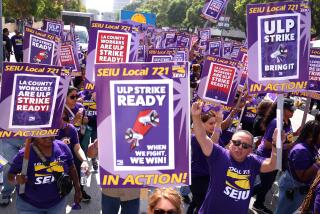Police Union Leaders, Hedgecock Hold ‘Very Friendly’ Private Talks
- Share via
In an effort to put the angry rhetoric of salary talks behind them, Mayor Roger Hedgecock met privately with leaders of the 1,380-member Police Officers Assn. (POA) on Thursday.
In a wide-ranging half-hour session in the mayor’s office, they discussed wages, the high mortality rate of San Diego officers and what the city should do to make the job of police officer a safer, more rewarding one.
Neither Hedgecock nor Ty Reid, who is president of the increasingly militant police union, could be reached for comment after the meeting.
But J. Michael McDade, the mayor’s chief of staff, described it as a “totally non-confrontational and very friendly meeting.”
Although it didn’t resolve any of the wide differences between the council and police, at least the meeting was an exploratory discussion of “the issues close to their hearts,” McDade said. Although it was not clear whether additional meetings would be held, “the mayor stressed the door is always open. He wants to continue talking,” McDade said.
McDade said Hedgecock’s meeting with Reid came about at Reid’s initiative, “to acquaint Roger with other members of the POA board who he had not met before.”
But another impetus was the letter Hedgecock sent to Reid on Tuesday asking for a meeting.
“Postures of bluster and bravado are simply not productive at this point,” Hedgecock wrote. “If (we) can meet quietly, thoughtfully and communicate rationally, considerably greater progress can be achieved for our officers and our citizens.”
“The intense pain and anguish you feel when an officer is killed is the same pain and anguish I suffer,” Hedgecock’s letter said. “But reality says that cutting out other important city services in order to pay the officers a little more is not going to reduce officer deaths or increase public support for police.
“Let’s use our good offices, you and I, and see how we can improve the daily lives of the people upon whom our safety depends . . . the police officer on the street.”
In addition to Hedgecock and Reid, several other POA leaders attended the meeting. So did McDade and Hedgecock’s incoming chief of staff, David Nielsen.
According to McDade, Hedgecock and Reid discussed the likelihood of success if some sort of initiative aimed at increasing police salaries or manpower were placed on the November ballot.
Hedgecock assured Reid that the council is proud of its police force and noted that the council on Tuesday had moved to correct a serious complaint of officers--a shortage of bulletproof vests. (The council Tuesday authorized the purchase of 200 more vests after officers, at an emotional meeting with Hedgecock last week, complained about the problem.)
On the issue of salaries, however, the mayor and POA leaders remained as far apart as ever, McDade said. The council on Tuesday approved a 5.5% raise for police next year, the highest raise of any city employee group. POA leaders are still seeking a 5% raise on July 1 and another 5% raise Jan. 1. Without such a raise, Reid and other POA officials say, police salaries here will remain from 9% to 30% below those of police salaries in other large California cities and many San Diego officers will quit this year.
Also Thursday, City Atty. John Witt issued a three-page legal opinion on several council members’ proposal to find reserves in the 1985-86 budget that could be appropriated to increase police salaries.
It said that, once the council approves a salary ordinance, as it did Tuesday, the City Charter does not allow salaries to be modified except for “a significant change in living costs.”
The council could replace that ordinance by introducing a new salary ordinance, but because an ordinance requires at least 42 days from the date it is introduced to become effective, the council would not be able to adopt a replacement ordinance on police salaries by the July 1 deadline that the City Charter requires.
Witt had offered a similar explanation to reporters after the council on Tuesday approved a 5.5% raise, then agreed to try to increase police salaries in the 1985-86 fiscal year. But this was Witt’s first explanation to the council.
Some council members are angry that Witt did not inform them of a problem while they discussed police salaries during Tuesday’s meeting. But Witt’s memo suggested that the council was to blame for not consulting him--and not doing so before Tuesday’s meeting.
More to Read
Sign up for Essential California
The most important California stories and recommendations in your inbox every morning.
You may occasionally receive promotional content from the Los Angeles Times.










